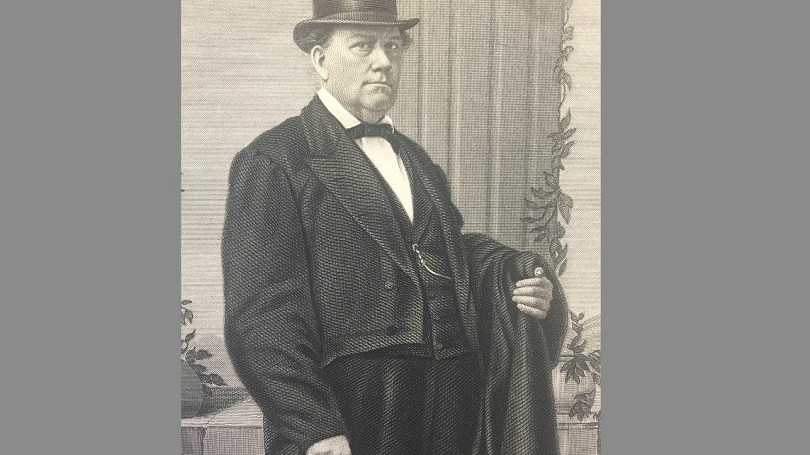
- Public Policy
- Leadership
- Funding
- News & Events
- About the Center
Back to Top Nav
Back to Top Nav
Back to Top Nav
Back to Top Nav
This article is part of a series honoring Dartmouth Alumni who have served in public office and demonstrated their commitment to the ideals of public service, leadership, and civic engagement.
For a contemporary of Lincoln, it was impressive to be known for one’s height. Towering at six feet and six inches, John “Long John” Wentworth, Class of 1836, cast a long shadow over American politics as the nation headed west for new prosperity.
A descendant of the royal governor who chartered the College in 1769, Long John’s extensive family legacy in New Hampshire made him a natural fit for Dartmouth. A fellow student wrote that “he stood among the first in his classes”; he earned the respect and awe of his classmates through creative trickery on campus and a notable harangue against the faculty shortly before his commencement. In the 1830s, the College required church attendance every day, tuition was $27, and room and board cost $60 (that totals to $2,810 in 2018 dollars—a bargain by today’s standards). Wentworth taught at public schools in Grafton County from December to early March during an extended winter break each year to pay for his education.
Many current students share the passion for politics that Wentworth exhibited over his four years in Hanover, with remarkable parallels in the subjects of debate. While students today testify to the New Hampshire state legislator on the issue of their voting rights in the state, Wentworth and his friends usurped a local school district at a town hall meeting with the power of their majority vote to symbolically caution against students voting over 180 years earlier.
Wentworth defied his Granite State heritage when he set out for the western fringe of the union after graduation. He arrived bedraggled and sick to Chicago after the journey of more than a week, but he quickly became a formidable political voice when he became managing director of the Chicago Democrat. A strong Jacksonian Democrat, Wentworth left law school less than a year in when his peers encouraged him to run for Congress just seven years after graduating from Dartmouth. In office Wentworth diffused a heated land dispute with Wisconsin and oversaw the build-up of the state’s infrastructure and transportation. In all he served six terms in Congress and was the mayor of Chicago for two years.
Wentworth’s ambitious career trajectory brought him into the orbit of the political and cultural luminaries of his time. For example, one of the seminal documents of the Mormon church was a letter sent to Wentworth from Joseph Smith outlining the history and tenants of the Latter-Day Saints church. He switched to the Republican party in the twilight of his career, but he maintained argumentative gifts and a shrewd political instinct regardless of his party affiliation. In 1867, he received an honorary degree from the College. The Chicago Times once called him the “greatest man in America,” but superlatives aside he proved to be a creative and formidable son of Dartmouth.
Written by Jimmy Fair ’18, Student Researcher for the Dartmouth College Public Service Legacy Project.